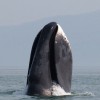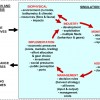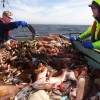Members of the Puntlab collaborate extensively with colleagues in the U.S. and worldwide. The following are short biographies of some of our current collaborators from outside of the University of Washington.
United States
University of Washington
Tessa Francis is the Lead Ecosystem Ecologist at the Puget Sound Institute, a research institute at the University of Washington Tacoma. At PSI, Tessa’s work centers on translational science: synthesizing ecological research on Puget Sound, communicating to decision makers, and helping provide the scientific foundation for ecosystem-based management in Puget Sound. She also leads a research program focused on ecosystem-based management of Pacific herring, in collaboration with colleagues at NOAA’s NWFSC and WA Department of Fish and Wildlife. Tessa is the Managing Director of the Ocean Modeling Forum, a joint project between NOAA and UW focused on improving the use and usefulness of models in ocean management decision making through multi-model approaches. Tessa is also an editor at the Encyclopedia of Puget Sound.
Northwest Fisheries Science Center
Jason Cope, a 2008 graduate from the Punt lab, has been a fishery research biologist (a.k.a. stock assessment scientist) since 2007. He has been specifically interested in developing methods to confront data limitations that affect scientifically-informed catch recommendations and stock status estimates. He is also interested in the collection and analysis of the basic biological and life history information used in population models.
Dan Holland is an economist leads the human dimensions team in the Conservation Biology Division at the NWFSC. He has worked for government, academia, and industry in different parts of the US and in New Zealand. Dan is President of the International Institute for Fisheries Economics and Trade. His research is focused primarily on design and evaluation of fishery management strategies and on governance of fisheries and marine ecosystems. He has a long standing interest in spatial aspects of fishery management such as marine reserves and area management. Current research foci include approaches for limiting fishery bycatch, bioeconomic modeling of coupled natural and human systems, and catch share quota markets.
James Thorson is a quantitative ecologist who researches meta-analytic methods and their application to life history theory, status and management approaches for fisheries worldwide, as well as methods for estimating population dynamics using limited or unusual data types. He is also interested in spatial modelling and time-series forecasting, in particular using semi-parametric and mixed-effect approaches.
Mellissa Haltuch conducts research on fisheries stock assessment methods, quantifying climate/environmental effects on population dynamics, using the bomb radiocarbon chronometer for age validation, and how to best provide scientific advice for fishery managers. The primary focus for this work is the U.S. West Coast groundfish fishery. Melissa also leads the U.S. West Coast petrale sole stock assessment as well as contributes to other groundfish stock assessments.
Michelle McClure is the director of the Fishery Resource Analysis and Monitoring Division. She has worked extensively in ecology and conservation biology, with a focus on Pacific salmon, but has recently transitioned to groundfish. Her general interests lie in the areas of population biology, with a particular focus on evolutionary effects of anthropogenic activity and resulting impacts on long-term sustainability and viability of species.
Owen Hamel is the Integrated Fisheries Stock Assessment Team Lead at the NWFSC. Owen conducts and reviews stock assessments for west coast groundfish, develops scientific research, works with colleagues to determine data collection priorities for surveys. Owen serves on the Scientific and Statistical Committee for the Pacific Fisheries Management Council and on NOAA Fisheries’ Assessment Methods Working Group. He is also on several graduate students studying at the University of Washington.
Phil Levin is the Program Manager for the Science for Ecosystem-based Management Initiative at NWFSC. Phil is a community ecologist and conservation biologist specializing in fishes in a variety of marine, estuarine and freshwater habitats. His focus is on complex interactions among ecological processes that ultimately produce the ecological patterns. He is a co-PI with Andre on the Ocean Modelling Forum.
Richard Methot serves as NOAA’s Senior Scientist for Stock Assessments and as affiliate faculty at UW. He conducts research on stock assessment methods and supports the widely used Stock Synthesis assessment model. Rick is involved with linking assessments to management advice, and coordinates several national programs across NOAA Fisheries. Rick is a SAFS Affiliate Professor and has been on many Puntlab graduate student committees.
Isaac Kaplan is a Research Fishery Biologist in the Conservation Biology Division at NOAA’s Northwest Fisheries Science Center. He earned his Ph.D with Dr. Jim Kitchell at University of Wisconsin-Madison in 2004, and attended Stanford University for his B.S. and M.S. in Biological Sciences. Prior to his current appointment, he was a postdoctoral fellow at NWFSC with Dr. Phil Levin. Currently, Isaac is a quantitative ecologist and modeler interested in marine fisheries and ecosystems. His work includes statistical analysis of survey data, stock assessment, food web modeling, and “end-to-end” Atlantis simulation models that include oceanography, ecology, and fishing fleet dynamics.
Alaska Fisheries Science Center
Kirstin Holsman is a Research Fishery Biologist with the NOAA Alaska Fisheries Science Center. Her present work is focused on the development of quantitative methods for ecosystem-based approaches to fisheries management and methods to assess and manage for climate-change impacts on fish and fisheries. It includes climate-specific multi-species stock-assessment models for the Bering Sea, Integrated Ecosystem Assessments, bioenergetics and food-web models, and field studies of climate and fishery interactions with marine ecosystems.
Anne Hollowed conducts research on the effects of climate and ecosystem change on fish and fisheries and leads the Status of Stocks and Multispecies Assessment program. Anne has been a member of the North Pacific Fishery Management Council Scientific and Statistical Committee for 10 years. Her research focuses on the intersection of fisheries oceanography and fisheries management. She has been an active participant in the design and implementation of several large multi-investigator, interdisciplinary research programs. Anne is a SAFS Affiliate Professor and has been on many Puntlab graduate student committees
James Ianelli has worked in fisheries research since the late 1970s. He is responsible for producing analyses used for the management of a number of important groundfish species in the North Pacific. His research interests include developing statistical approaches for ecosystem/fisheries conservation management. He chairs the North Pacific Fishery Management Council’s groundfish Plan Team, serves on the Advisory Panel for the Commission for the Conservation of Southern Bluefin Tuna, and is president of the ADMB Foundation. Jim is a SAFS Affiliate Professor and serves as a committee member for several graduate students.
Kerim Aydin is the Program Leader for the NOAA Alaska Fisheries Science Center’s Resource Ecology and Ecosystem Modeling and Integrated Ecosystem Assessment Programs. His research includes the application of food web, bionergetics, and foraging models to fisheries management issues. He received his PhD from SAFS in 2000.
Martin Dorn leads the stock assessment team for walleye pollock in the Gulf of Alaska. He is currently a member of the Scientific and Statistical Committee of the Pacific Fishery Management Council and chair of its Ecosystem subcommittee, and is a member of the Crab Plan Team of the North Pacific Fishery Management Council. He is an Affiliate Associate Professor in SAFS and have been on several Puntlan graduate student committees.
Michael Dalton is an economist at the Alaska Fisheries Science Center. He works on several projects related to Alaska fisheries and global trade, effects of climate change, and dynamic optimization methods in bioeconomic models with multistage population dynamics. He is collaborating with Puntlab members to develop bioeconomic models that forecast effects of ocean acidification on Alaska crab stocks.
Robert Foy is is the Director of the AFSC Kodiak Laboratory and responsible for the annual Eastern Bering Sea crab stocks surveys. His expertise includes stock assessment and biological analysis of fish and crab species. He has been collaborating with PuntLab members of the development of stock assessment models and the bioeconomic consequences of ocean acidification.
Southwest Fisheries Science Center
Kevin Hill’s research areas of interest include fish population dynamics, age determination and growth estimation, stock assessment modeling, and fisheries management. He has focused primarily on coastal pelagic species stock assessments (Pacific sardine and Pacific mackerel) since 1997. Kevin served on the Pacific Fishery Management Council’s Scientific and Statistical Committee, and its Coastal Pelagic Species Management Team. He is currently the leader of FRD’s Population Dynamics program.
Alaska Department of Fish and Game
Siddeek Shareef is biometrician and technical representative on fishery management issues for king and tanner crab fisheries in the Bering Sea and Aleutian islands areas. He collaborates with Puntlab members of stock assessments for crab stocks.
Other US
Mark Maunder is the head of the Stock Assessment Program at the Inter-American Tropical Tuna Commission (IATTC). He is founder and owner of Quantitative Resource Assessment LLC, co-founder and former President of the AD Model Builder Foundation, and cofounder of the Center for the Advancement of Population Assessment Methodology (CAPAM). Mark’s research focuses on the development of statistical methodology for fisheries stock assessment, protected species, and ecological modeling.
Paula Moreno is a Research Scientist in the Department of Coastal Sciences and University of Southern Mississippi. She manages a project aimed at better understanding the status of marine mammals and improving the methods used to evaluate the risks posed by fisheries. The project relies on a team of four scientists, including Andre Punt, who have expertise in stock assessment techniques and in marine mammal interactions with fisheries..
International
Argentina
Ana Parma conducts research on fisheries modeling, assessment and management, working for the Argentine National Council for Science and Technology. She studies fisheries from different angles, ranging from technical aspects of fish stock assessments, modeling and the design of effective harvest control rules, to institutional aspects of decision-making and fisheries governance.
Australia
Anthony (Tony) Smith is a chief research scientist at CSIRO in Hobart, Australia. His interests include developing scientific tools to support ecosystem based management and the performance of fishery management systems. Tony is a SAFS Affiliate Professor is currently a member of Felipe Hutrado’s PhD committee.
Beth Fulton leads the marine ecosystem modelling at CSIRO. She and her team specialise in using end-to-end ecosystem models (e.g. Atlantis) to consider ecosystem based management of marine and coastal resources. Originally focusing on fisheries they have now extended the modelling approaches to integrated management across all sectors – such as tourism, shipping, oil and gas, mining, urban developments and catchments.
Caleb Gardner is the Director of the Sustainable Marine Research Collaboration Agreement, Institute for Marine and Antarctic Studies, University of Tasmania. His research is mainly on the larger marine industries of farmed Atlantic salmon and wild harvest blacklip abalone and southern rock lobster. He also conducts research of recreational fisheries, scalefish, crabs, scallops and oyster culture.
David Smith
Cathy Dichmontis a Senior Principal Research Scientist with CSIRO. She conducts research on stock assessment, modeling natural systems, natural resource management, shared fisheries stocks, and management strategy evaluation (MSE). She was a key contributor to the bio-economic model that aided the development of the Prawn fishing industry in the Gulf of Carpentaria.
Éva Plagányi is a research scientist based at the Brisbane laboratories of CSIRO. She works on stock assessment modelling, ecosystem modelling and management strategy evaluation. Some of her current projects include the assessment of the Torres Strait tropical rock lobster, including consideration of biological, socio-cultural and economic factors; developing Models of Intermediate Complexity for Ecosystem assessments; and adaptive management under changing climate.
Geoff Tuck has worked on assessments of southern bluefin tuna, Macquarie Island Patagonian toothfish, silver warehou and blue grenadier. In addition, he has considered the impacts of incidental fishing mortality on seabirds, and albatross in particular. He is currently the Team Leader of the Temperate Stock Assessment and Management Strategy Evaluation Team of the Oceans and Atmosphere Flagship, which uses quantitative methods to assess and provide management advice for southern Australian fisheries.
Malcolm Haddon works mostly on stock assessment methodology, especially relating to data-poor fisheries; management strategy evaluation, often for invertebrate fisheries; length-based modelling, especially of abalone stock dynamics; and the policy implications of alternative harvest strategies and biological reference points.
Richard Little is a Senior Research Scientist at CSIRO. His research specialises in modelling population dynamics, economics, and management decision-making in natural resource and marine environmental science. Much of this work has focused on the Coral Reef Finfish Fishery of the Great Barrier Reef, where he has worked on the development of a computer-based decision support tool called ELFSim. He has published work widely on modelling tradeable permit markets for fisheries quota, artificial intelligence mechanisms (Bayesian Belief Networks) for simulating fishing behaviour, and the economics of marine protected areas.
Richard McGarvey heads the fishery modelling group at SARDI Aquatic Sciences. His research topics include tag-recovery data (estimating mortality, movement and growth), length- and age-based fishery modelling, and more recently, bioeconomic modelling for harvest strategy evaluation.
Japan
Toshihide Kitakado is an associate professor in the Department of Marine Biology at Tokyo University of Marine Science and Technology. His research interests include statistical genetics, abundance estimation, survival analysis and ecological modelling. Toshi was chair of the Scientific of the Whaling Commission between 2012 and 2015.
New Zealand
Pamela Mace is the Principal Adviser Fisheries Science at the Ministry for Primary Industries. She has been heavily involved in the national and international development of precautionary approaches and harvest control rules for fisheries management, the development and implementation of national standards for overfishing definitions and rebuilding plans, investigation of methods for defining and implementing ecosystem approaches to fisheries (EAF), development of criteria for defining species at risk with respect to both the Convention for International Trade in Endangered Species of Fauna and Flora (CITES) and the U.S. Endangered Species Act, and various science quality assurance projects for reviewing and improving fish stock assessments in the United States, Canada and New Zealand.
South Africa
Doug Butterworth is an emeritus professor of Applied Mathematics at the University of Cape Town. He has conducted research on international fisheries, particularly whales and bluefin tuna. For South Africa, his research has considered species such as hake, rock lobster and squid as well as Prince Edward Island toothfish, and the relationship between penguin populations and pelagic fishing.
Taiwan
Chi-lu Sun is a Professor of Fisheries, at the Institute of Oceanography, National Taiwan University. He research interests include fish biology, population dynamics, stock assessment, and management of highly migratory species. Several of Chi-lu’s students have visited the Puntlab during their programs
United Kingdom
Cherry Allison is the Head of Statistics at the International Whaling Commission. Cherry has been involved with the development and evaluation of the management procedures for commercial and aboriginal subsistence whaling. She also leads to effort to collate historical whaling catch records
Greg Donovan is the Head of Science at the International Whaling Commission. Hisprinciple fieldwork concerns the estimation of abundance of cetaceans and he has led numerous international survey efforts using both ships and aeroplanes. His theoretical work largely concerns issues related to population dynamics and the use of computer modelling of populations in a conservation and management context.


